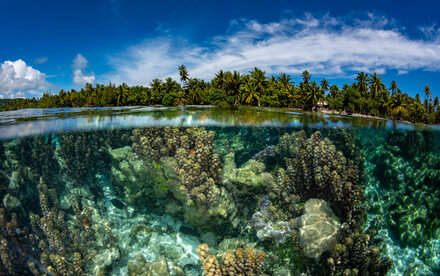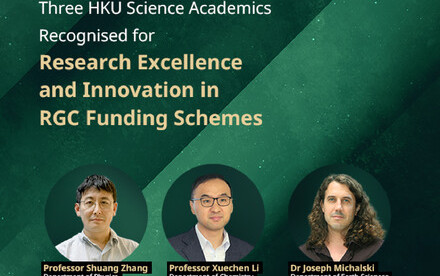01 Aug 2021
HKU Science celebrates the opening of the expansion of the Swire Institute of Marine Science and launches the ‘Restoring Hong Kong’s Whale’ Campaign to revitalise marine conservation icon
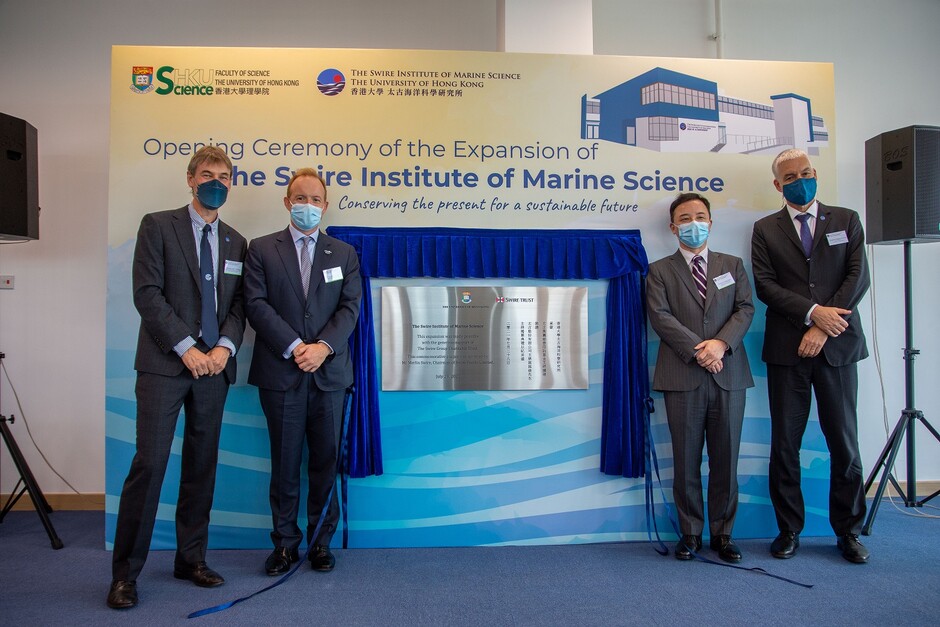
The Re-opening Ceremony of the Swire Institute of Marine Science took place yesterday (July 28) at Cape d’Aguilar Marine Reserve, celebrating the expansion of the Institute and marking the beginning of a new chapter in marine research for Hong Kong.
Video Highlights
A Plaque Unveiling and Opening Ceremony took place on July 28, 2021 at the Swire Institute of Marine Science (SWIMS), Faculty of Science of The University of Hong Kong (HKU), at Cape d’Aguilar Marine Reserve, celebrating the opening of SWIMS’ expansion and marking the beginning of a new era in marine research. Riding on its re-opening, SWIMS also launches the ‘Restoring Hong Kong’s Whale’ Campaign to restore the fin whale skeleton, the symbol of marine conservation that has been sitting on the shore beside SWIMS for 3 decades, in the hope of revitalising the icon and appealing for support to educational activities.
Since its inception in 1990, SWIMS has long been a premier marine centre driving our understanding of coastal marine ecosystems in Hong Kong and surrounding regions. Whilst earlier research relied on more field-based approaches, recent technologies have revolutionized marine biology and the new expansion. Three decades since its launch, it comes at an opportune time for SWIMS to modernise and expand its research capacity to provide HKU researchers with state-of-the art facilities.
At the ceremony, President and Vice-Chancellor of HKU Professor Xiang Zhang expressed his heartfelt gratitude to The Swire Group Charitable Trust (Swire Trust) for its continued and committed support of SWIMS research in marine conservation. “The expansion of SWIMS coincides with the University’s development blueprint of building an innovative knowledge hub and redefining the world. This transformative vision, the expansion, and new state-of-the-art facilities will help SWIMS achieve its goal of conserving our rich marine biodiversity to build a sustainable coastal ecosystem. The newly expanded SWIMS will become one of the most iconic landmarks of HKU and I look forward to its great success.”
Mr Merlin Swire, Chairman of Swire Pacific Limited, said: “I congratulate HKU and the Faculty of Science on this wonderful new expansion to SWIMS. Swire has a long history of supporting HKU, and our support for SWIMS has been a highlight of that enduring partnership. When Swire first sponsored the establishment of the SWIMS facility here at Cape d’Aguilar in 1990, we hoped to make a positive contribution to protecting Hong Kong’s unique marine habitat by supporting scientific research and education. In the thirty years since then, SWIMS has gone from strength to strength, establishing itself as one of the leading marine research institutes in the region, dedicated to protecting and sustaining the coastal ecosystem. This new extension will facilitate even closer collaboration with international research organisations, bringing a global perspective on local loss of biodiversity, including the effects of climate change, as well as offering more opportunities for outreach and education. We are proud to have played a part in opening up this exciting new chapter for SWIMS.”
Then Dean of HKU Science Professor Matthew Evans echoed that Hong Kong, as a coastal metropolis strategically situated at the heart of Asia, is a vital hub to drive research in marine science. “Our newly set up marine biodiversity centre will soon establish an extensive physical and electronic reference base of Hong Kong’s marine life, which will be of use to scientists, government departments, NGOs and environmental institutions,” said Professor Evans. “The new facility will also introduce local citizens and students to the diversity of amazing sea life through its proposed outreach and knowledge transfer programmes.”
About the expansion and new facilities
Forming an L-shape with the existing main building, the expansion and renovation will comprise a molecular laboratory, biodiversity centre and both indoor and outdoor seawater aquaria, providing state-of-the-art facilities for its growing body of new staff and research students. “Through the addition of new facilities, SWIMS will be able to host more researchers from around the world and maintain its leading role in marine science research, while also catering to the growing interest in local marine ecology and biodiversity being developed by citizens in Hong Kong,” said Professor Gray A Williams, Director of SWIMS.
About the Swire Institute of Marine Science
The Swire Institute of Marine Science (SWIMS), originally named the Swire Marine Laboratory, was established in 1990 and is located at Cape d’Aguilar as an off-campus facility of HKU’s Faculty of Science. SWIMS facilitates and enhances interdisciplinary research, with its major research focus on coastal marine systems and their biodiversity and ecology, particularly in relation to the themes of habitat destruction and restoration; global change and adaptation; and overexploitation and sustainability. It currently has around 75 scientists conducting active research, including many which stay in its accommodation on the cliffs overlooking SWIMS, and has recently received funding from the Swire Group Charitable Trust, the Faculty of Science, the University, and the HKSAR Government to expand its facilities to enhance its vibrant research environment. Website of SWIMS: https://www.swims.hku.hk
| The Swire Institute of Marine Science (SWIMS) is an off-campus research and education facility under HKU Science. | The Cape d’Aguilar Marine Reserve, Hong Kong’s only marine reserve where the Swire Institute of Marine Science (SWIMS) is located, is rich in biodiversity. |
 | 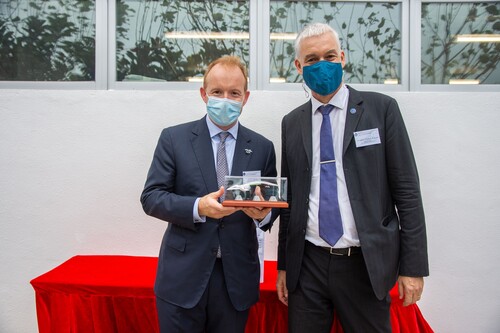 |
The Re-opening Ceremony of the Swire Institute of Marine Science took place yesterday (July 28) at Cape d’Aguilar Marine Reserve.The officiating guests gathered to unveil the plaque for SWIMS’ expansion. From the left: Professor Gray A Williams, Director of SWIMS, HKU; Mr Merlin Swire, Chairman of Swire Pacific Limited; Professor Xiang Zhang, President and Vice-Chancellor of HKU; Professor Matthew R Evans, then Dean of Science, HKU. | Replica of whale skeleton produced by 3D printing was presented to officiating guest Mr Merlin Swire, Chairman of Swire Pacific Limited, by Professor Matthew R Evans, then Dean of Science, HKU. |
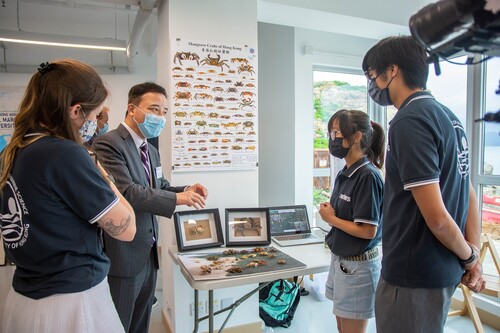 | 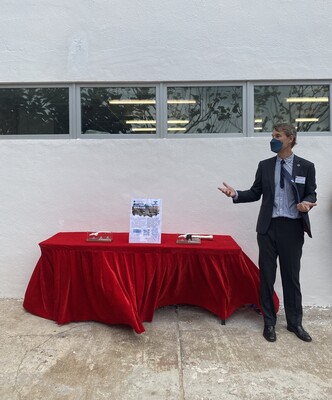 |
| Professor Xiang Zhang, President and Vice-Chancellor of HKU was interacting with the researchers while visiting the Biodiversity Centre. | Director of SWIMS Professor Gray A Williams introducing the mission of the ‘Restoring Hong Kong's Whale’ campaign, which focuses on raising funds to restore the icon of marine conservation in Hong Kong and to support outreach activities at SWIMS. |
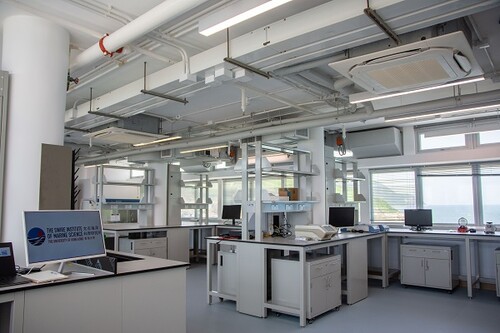 | 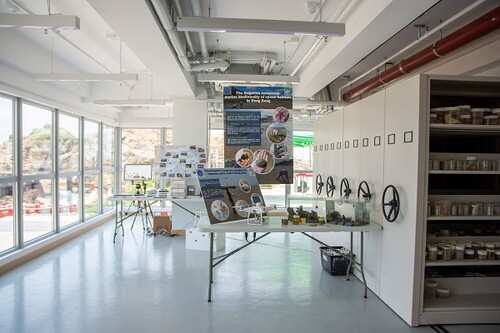 |
Molecular Laboratory - What used to be staff offices and storage space has been converted into a brand new, state of the art molecular lab. It provides a highly sterilised and dry environment for extracting DNA of specimens and performing downstream molecular analysis using advanced equipment. | Biodiversity Centre - As part of the new structure, the centre will be a multipurpose space for public outreach and community engagement, a classroom for visiting school groups, and a library which houses the SWIMS museum specimen collection. The specimen collection mostly collected from Hong Kong, which will continue to be used for research purposes. |
| Aquarium - Expanded from the existing structure, containing approximately 50-60 individual tanks in different dimensions to accommodate species of different sizes. The aquarium is designed specifically in a controlled environment where lighting and temperature are adjustable for manipulating a day cycle that simulates an environment according to the needs of different species. | The Wet Lab - Associated with the Aquarium, it is designed to perform physiological measurement and dissection of specimens. |
To visit the photo gallery, please click here!





